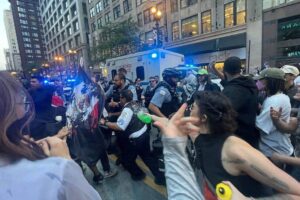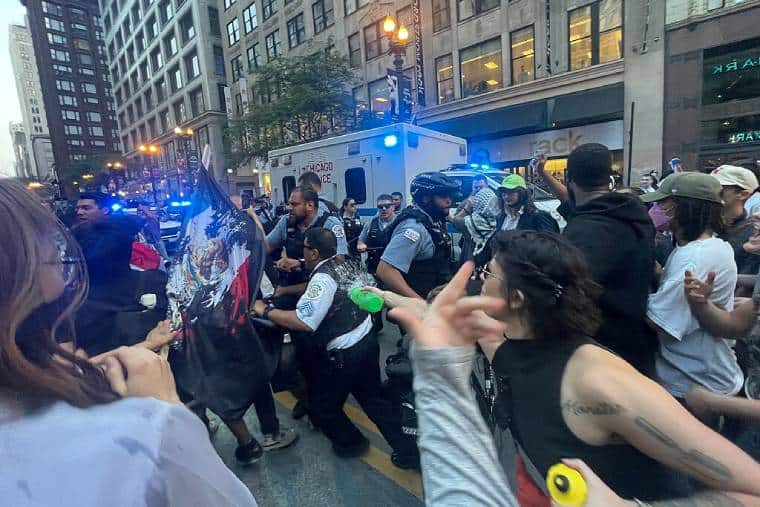
Ice is targeting and harassing ordinary people in Chicago in an escalation of militarism
By Judy Cox
Downloading PDF. Please wait…
Sunday 12 October 2025

Resisting Ice in Downtown Chicago (Pic: Wikimedia commons)
Sara Paretsky is the award-winning author of the hugely popular VI Warshawski novels. Sara spoke to Judy Cox about militarisation and the threat to democracy in Donald Trump’s America.
SW: What have you been seeing in Chicago?
I live in the South Side of Chicago, which means something specific in terms of race and class. It’s a more upmarket area, and it is very racially mixed. There is an Afro-American community and now there is a significant Hispanic population, mainly Mexicans.
The North Side is mainly populated by white Europeans.
There is a lot of Ice—Immigration and Customs Enforcement—action on the South Side, where the largest Hispanic population is.
I go to events to look out for Ice activities. I live near the Museum of Mexican Art, which was set up by women in the community. I go there to check for Ice, but they have not targeted it yet.
They are targeting ordinary people. A few days ago, they targeted an apartment near where I live with tear gas and pepper balls. They ripped the building apart and wrenched babies from their mothers’ arms and handcuffed them. They were left naked in the streets for hours.
They are reprising what happened in the 1930s in Germany and in Spain.
We hear Black Hawk helicopters circling overhead. It is not Syria—they are not dropping bombs—it is all about intimidation.
The administration has banned the use of civilian drones because they were being used to track Ice activity.
SW: Why do you think this militarisation is happening now?
We are thinking that the goal is the militarisation of the city so free elections can’t be held next year. They know the Maga Republicans would be voted out.
Donald Trump has dementia. It is Russell Vought who is the policy setter. Vought wrote Project 2025 and he runs the Heritage Foundation. In the summer before the election, Vought recruited 4-5,000 volunteers.
As soon as Trump was inaugurated, Vought had all the executive orders ready to sign. And these thousands of volunteers were ready to comb through the websites of organisations and end federal funding for any that used the language of diversity, equity and inclusion.
That’s things like food programmes and programmes for low income children. I have a friend who runs a programme aimed at cutting infant mortality. She erased 400 words from the organisation’s website to protect its funding.
Another friend runs a programme researching uterine thyroids. She has to write an application without mentioning the word “women”.
Another friend who is a biomedical researcher had her funding threatened because she had too many women on her team.
America was never perfect. But we had people trying to expand the concept of social justice and welfare. It is a great grief to see what is happening now, how things like medical research are being gutted.
The vaccination programme in Sudan has been cut. A friend who runs a programme for children with cancer in Malawi is facing draconian cuts.
SW: The proceeds from your latest book are going to reproductive rights campaigns
Reproductive rights vary from state to state. My state, Illinois, has one of the best provisions for abortion and women’s health care because the two go together.
Our governor, JB Pritzker, is pro-choice and supports fundraising for abortion groups.
About 40 percent of the women having abortions here come from out of state because Illinois is near the southern states which have the most restrictions on abortions.
Women are arriving here not just for abortions but with serious health problems, things like ectopic pregnancies that they can’t get treated where they live.
Hospitals are charging women $17,000 to save their lives, so we are fundraising to help women with that.
SW: Are there other ways we can resist the attacks?
I joined a rapid resistance unit. More and more people are joining in Chicago and across the country. Because more and more people are seeing the danger we are in and the damage being done.
What we are seeing is shocking. I am named after two of my grandmothers who died in the Shoah. I think about what they went through, being dragged from their beds, being marched away—and it is happening right here and right now to my neighbours.
I don’t expect the regime to care, any more than Joseph Goebbels cared. I am the third generation since my grandmothers’ time. Trauma lingers through the generations.
It is not enough to write about what is happening—we have to be in the streets and we have to protect people.
The writer Rebecca Solnit said no football coach goes into the dressing room before a game and says, “look, we’re going to lose but we have to play anyway.”
I have to believe we will prevail. I hope it will be in my lifetime, but anyway, I hope that what I do helps make that possible.
